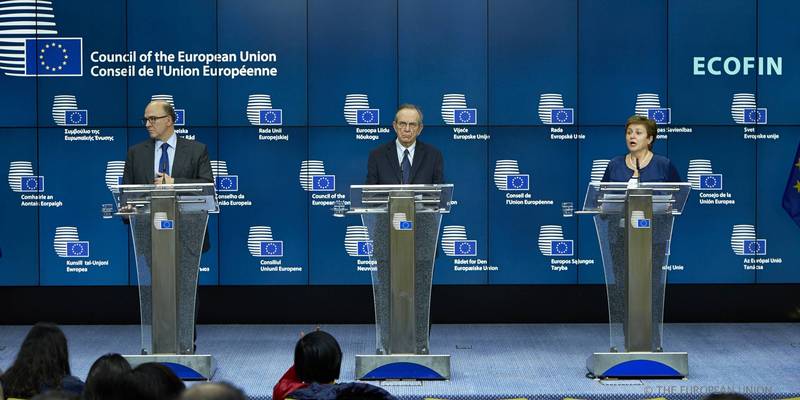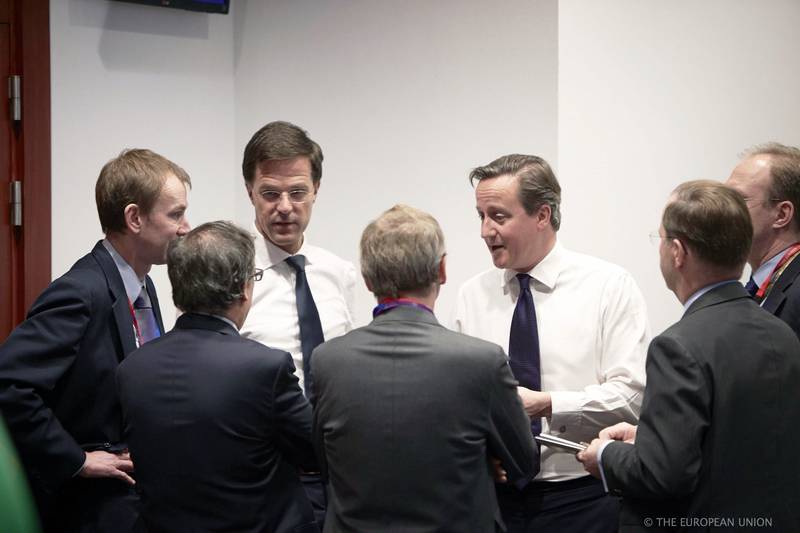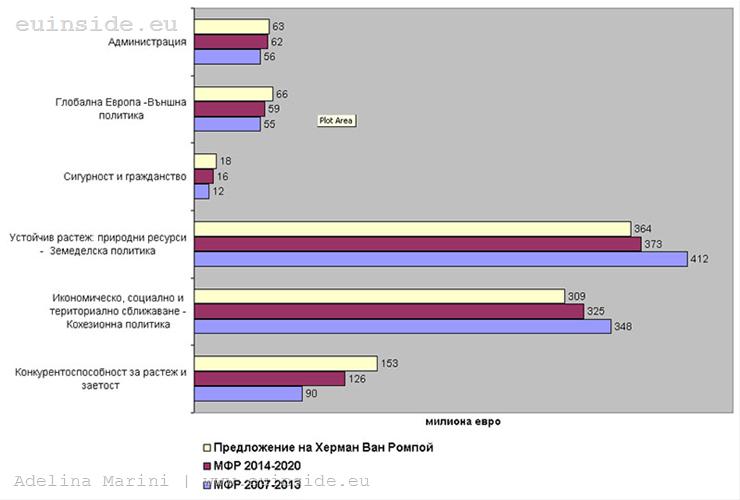Kristalina Georgieva Will Propose Urgent Amendments to the EU Budget
Adelina Marini, November 12, 2014
 The European Commission will today (12 November) propose amendments to the own resources regulation in an attempt to solve the problem that emerged during the October European Council with the corrections of some member states' contributions to the common EU budget. In the end of each year, the Commission recalculates the member states' contributions on the basis of the data about their economic performance (gross national income), prepared by the national statistic offices. Depending on these data, some countries have to top up their contributions while others get money back. This year, however, is extraordinary because several member states filed data on the basis of which their contribution increases several times. Most striking is the UK's case which has to pay into the European budget a supplementary amount of 2.1 billion euros on 1 December. The news evoked the stormy and quite out-of-control reaction of Prime Minister David Cameron on the second day of the summit.
The European Commission will today (12 November) propose amendments to the own resources regulation in an attempt to solve the problem that emerged during the October European Council with the corrections of some member states' contributions to the common EU budget. In the end of each year, the Commission recalculates the member states' contributions on the basis of the data about their economic performance (gross national income), prepared by the national statistic offices. Depending on these data, some countries have to top up their contributions while others get money back. This year, however, is extraordinary because several member states filed data on the basis of which their contribution increases several times. Most striking is the UK's case which has to pay into the European budget a supplementary amount of 2.1 billion euros on 1 December. The news evoked the stormy and quite out-of-control reaction of Prime Minister David Cameron on the second day of the summit.
He insisted on an urgent meeting of the EU ministers of finance to discuss a possible solution to the problem. That meeting took place last Friday in Brussels. It was the first big test for the Bulgarian member of the European Commission, Kristalina Georgieva, who in Jean-Claude Juncker's Commission is a vice president responsible precisely for the budget issues. The ministers came up with rather concise conclusions on the matter tasking the Commission to make a proposal for amendment that should introduce flexibility in times of extraordinary circumstances as this year. The member states also want the automaticity of payment to be removed in years like this and to be given a chance to pay in instalments not later than 1 September of next year. Currently, the regulation envisages a strict automatic deadline for payment - 1 December. When the corrections are so strikingly big, though, this deadline becomes very tough to meet.
Ms Georgieva explained after the meeting that this year, indeed, is unusual. In 2013, the total correction was only 360 million euros, while in 2014 it is 9.5 billion euros. The closest to this amount increase of the correction was in 2007 when it was 3.7 billion euros, "which means two times and a half less than what we have this year", Kristalina Georgieva explained. As in previous years the sums were relatively small, there was never a problem with payment in time. The proposal the Commission will table will include four new elements. First, she said, a strict definition of "extraordinary circumstances" will be made, putting also a threshold which, if exceeded, will signal that there are extraordinary circumstances. This threshold, according to preliminary calculations, is expected to be circa 5 billion euros. Secondly, there will be a possibility to pay in instalments when there in unusual years. In usual years, the payments will be as before.
The third measure is to ensure equal treatment of the member states. This does not mean an admission that the Commission treated them unfairly, but it is about a very complex mechanism the need for which stems from the option to pay in instalments because this will affect those countries that are to receive money back. With the current method, which will be maintained should there not be extraordinary circumstances, all member states have to pay on 1 December without exception. This gives the Commission the opportunity to make the relevant calculations and in the next year to return money to those countries whose gross national income was less than expected and therefore they overpaid in the common budget. When individual member states are given the chance to pay in instalments by 1 September of the next year, this will affect those who expect change. The amendment will allow the member states to choose in what way they prefer to pay.
Fourth, the European Commission vice president said, there will be transparency in the way the contributions are formed without violating the independence of the national statistical offices. Even before any details were clear from the upcoming proposal, British Treasury Secretary George Osborne was quick to announce that Britain had secured its supplementary payment to be halved. However, this is not quite accurate. Although the ministers of finance discussed other important issues during their meeting on 7 November, the issue of the European budget dominated the press conference after it. This was practically Kristalina Georgieva's baptism of fire, because in her previous term she was not used to answer the persistent questions of British journalists.
On the occasion of London's claims that the contribution had been halved, she said that actually what happens is a spacing out of the obligation. If the proposal the Commission will present today is to be approved by the end of the year (there is an agreement for retroactivity), then Britain will be able to space its payment out in the next year. Then, it will coincide with the payment of the famous British rebate - the discount agreed by British Prime Minister Margaret Thatcher - which represents, in practise, a return of money to the British taxpayers because in the first years of UK's membership they paid more than they received back. And although the situation has radically changed since then, to Britain the rebate is a matter of staying in the EU. Because of the coincidence of the contribution payment and the payment of the rebate, Britain will practically pay 1 billion euros less - instead 2.1 billion euros supplementary payment London will pay just 1 billion.
 In real terms, this is not "halving" of the contribution but an accounting coincidence. If Britain pays its supplementary contribution of 2.1 billion euros on 1 December, it will get the one billion euros back in the form of a rebate next year because, as Ms Georgieva explained, when the contribution goes up the rebate, too, goes up. But if it decided to pay in instalments, then one of them will coincide with the payment of the rebate and thus will neutralise that instalment. In this regard, she said, George Osborne is right.
In real terms, this is not "halving" of the contribution but an accounting coincidence. If Britain pays its supplementary contribution of 2.1 billion euros on 1 December, it will get the one billion euros back in the form of a rebate next year because, as Ms Georgieva explained, when the contribution goes up the rebate, too, goes up. But if it decided to pay in instalments, then one of them will coincide with the payment of the rebate and thus will neutralise that instalment. In this regard, she said, George Osborne is right.
The expected changes will affect also the currently discussed draft amending budget number 6 for this year. The annual European budgets are being changed several times a year to reflect most accurately the member states' contributions. In the past years, were approved payment appropriations that were significantly below the European Commission's forecast needs. Thus, a hole in the budget emerged. For the first time, this happened in 2011 but as the hole was not filled back then, it is constantly transferred in the subsequent year and is increasing like a snow ball. In the end of 2012, the Commission transferred 16 billion euros of deficit into 2013 where, together with the 2013 hole in 2014 were transferred 26 billion euros. It is yet to see what the final amount of the deficit will be this year. Kristalina Georgieva said that because of the expected changes, the amended budget for this year will have to be moved further in the future when there will be money to pay the change back of those countries with lower GNI than forecast. She promised that her team will work tirelessly until the proposal is ready. Yesterday, the Commission announced that it will be discussed at today's College meeting and later presented to the public.
 Mark Rutte, David Cameron | © Council of the EU
Mark Rutte, David Cameron | © Council of the EU | © European Parliament
| © European Parliament | © euinside
| © euinside